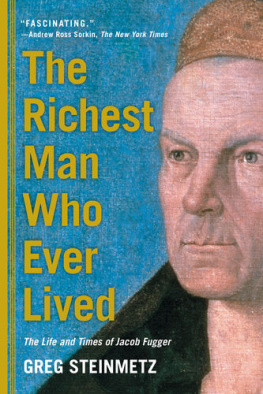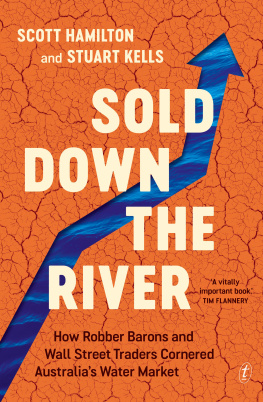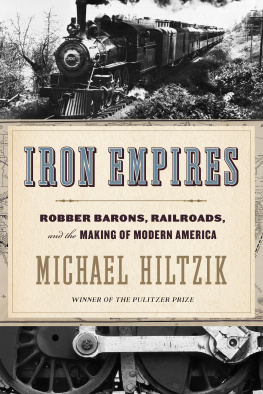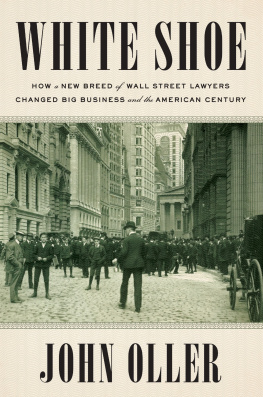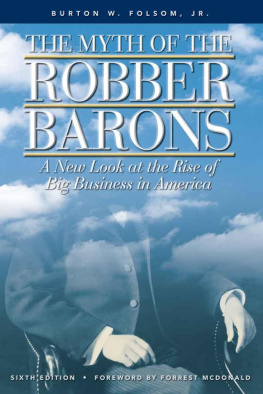Praise for Dark Genius of Wall Street
Renehan... turns in a masterful glance at the social history of the Gilded Age as well as a brilliant biography of Gould.... Renehans sumptuous prose and his dazzling research and style provide a window into Goulds ambitions and offer a first-rate social history of the financial workings of his time.
Publishers Weekly (starred review)
Renehan... [demonstrates] from contemporary sources that Goulds misdeeds have been much exaggerated over a century of telling.... [Gould] was no better and no worse than the sharks of todays corporate world, but unlike most of them he was without vanity and did not pretend to be anything other than what he was. Renehans meticulous portrait does him proud.
Martin Vander Weyer, Spectator (London)
... a primer for our own dark age of business leaders.... Renehans dead-on biography is proof it happened before, and, if anything, Gould was better at it than the current collection of fraudsters.
Ed Leefeldt, Bloomberg
Renehans engaging descriptions of Goulds exploits make the reader realize how much the markets have cleaned up in our ageand, alas, how much less fun they are to write (or read) about now.
Joseph Nocera, Sunday New York Times Book Review
Dark Genius of Wall Street is a masterworkentertaining, readable, and informativeby one of Americas leading biographers. In our new Gilded Age of technological and financial transformation, this comprehensive reexamination of the most brilliant and enigmatic of all the Robber Barons could not be more timely.
James Strock, author of Theodore Roosevelt
on Leadership and Reagan on Leadership
Renehan masterfully recalls Gould the business builder (his railroad empire, including the Union Pacific, was one of the most extensive and best run of the age) and family man, who reveled in collecting books and orchids (the latter grown in his enormous greenhouse at Lyndhurst, his Westchester estate). Gould was clearly no saint, but with Renehans even-handed biography we get a clear picture of the man for the first time.
Reed Sparling, Hudson Valley Magazine
Renehans zestful recounting of the intricate maneuvers involved in the titanic struggles over the Erie and Union Pacific railroads, Western Union and the Manhattan Elevated amply make the point that Gould was no more unscrupulous than his opponents and frequently a lot smarter.
Wendy Smith, Washington Post Book World
The battle for the Erie is a set piece of the Gilded Age, and no Gould biographer can shirk from it. Mr. Renehan does a good job of conveying the utter lack of scruples of each of the major players... [and] commendably cleanses the historical record.
Roger Lowenstein, The New York Times Business Section
ALSO BY EDWARD J. RENEHAN, JR.
The Kennedys at War
The Lions Pride:
Theodore Roosevelt and
His Family in Peace and War
The Secret Six
John Burroughs: An American Naturalist
DARK GENIUS
OF WALL STREET
The Misunderstood
Life of Jay Gould,
King of the Robber Barons
EDWARD J. RENEHAN, JR.
A Member of the Perseus Books Group
New York
Dedicated to the memory of
Alf Evers
Catskills historian extraordinaire
19052004
Copyright 2005 by Edward J. Renehan, Jr.
Hardcover edition first published in 2005 by Basic Books,
A Member of the Perseus Books Group
Paperback edition first published in 2006 by Basic Books.
All rights reserved. Printed in the United States of America. No part of this book may be reproduced in any manner whatsoever without written permission except in the case of brief quotations embodied in critical articles and reviews. For information, address Basic Books, 387 Park Avenue South, New York, NY 100168810.
Books published by Basic Books are available at special discounts for bulk purchases in the United States by corporations, institutions, and other organizations. For more information, please contact the Special Markets Department at the Perseus Books Group, 11 Cambridge Center, Cambridge, MA 02142, or
Designed by Jeff Williams
Cataloging-in-Publication data for this book is available from the Library of Congress.
Hardcover: ISBN-13: 978-0-465-06885-2; ISBN-10: 0-465-06885-5
Paperback: ISBN-13: 978-0-465-06886-9; ISBN-10: 0-465-06886-3
eBook ISBN: 9780786722310
06 07 08 / 10 9 8 7 6 5 4 3 2 1
PREFACE
In mid-December 1892, the banker Jesse Seligman gave an interview to a reporter from the New York Tribune. Seligmans friend Jay Gould had been buried a week earlier. He described the dead mogulwhose empire had included the Western Union Telegraph Company, the Missouri Pacific, the Union Pacific, and the Manhattan Elevated Railroadas the most misunderstood, most important, and most complex entrepreneur of this century. Seligman said he found it ironic that Gould was always cast as the arch demon in any telling of the nations recent financial history. If Gould was a sinner, asked Seligman, exactly who were the saints?
Seligman ran down the list of contenders, starting with Cornelius Vanderbilt. The foulmouthed and brutal old Commodore never claimed to have any agenda other than his own aggrandizement. Was he really to be revered? (On one famous occasion, when asked to contribute to the poor, Vanderbilt cited his modest beginnings, pointed to a line of people waiting for bread, and said, without a hint of irony, Let them do what I have done.) Next Seligman called up the memory of Daniel Drew, the pious founder of the Drew Theological Seminary, with whom Gould and Jim Fisk had joined forces to defeat Vanderbilt and gain control of the Erie Railroad. The Bible-thumping Drew had started his career herding cattle across the Alleghenies in the late 1820s and then brought his habits as a drover to Wall Street, watering stocks just as hed always watered his beef. Was Mr. Drew really any better than Mr. Gould? Seligman asked. And what of John D. Rockefeller, the avid, Why, asked Seligman, is Rockefeller held in so much higher esteem than Gould in the public mind?
Certainly Gould was shady at times, said Seligman, mentioning in particular that lengthy experiment in stock manipulation dubbed the Erie Wars. Seligman also acknowledged Goulds infamous 1869 campaign to corner the gold market in collaboration with Fisk: an escapade that triggered the Black Friday panic and ruined many investors. The same event cemented Jays reputation as a financial vampire. This was an image that an energetic press continued to burnish thereafter, once it was realized that the crimes of Jay Gould, whether true or not, sold well on street corners. But Seligman did not see Gould as any more or less a criminal than most operators of his era: I cant say that Mr. Gould was, in his moral nature, much better, much worse, or much different than any other shrewd and sharp player of his generation, said Seligman. Ive known them all. Ive known Jay Gould better than most. And I can tell you he deserves no more notoriety than those against which, and with which, he played. If he was exceptional, it was as a strategist. He had a certain genius. Time and time again, Wall Street never saw him coming.
Ignoring Seligmans plea, three generations of biographers, taking their cues from the nearly uniform bad press Gould received in life, built him into an evil genius of almost Wagnerian proportions: dark, soulless, and unstoppable. In his


